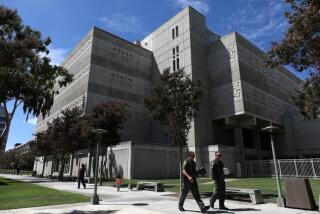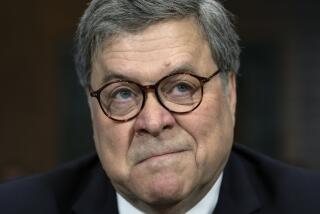Blowing Whistle Opposed at the Top : Defense: A 1989 Justice Dept. memo seems to give credence to accusations that the agency responsible for prosecuting alleged contractor fraud dragged its feet on complaints.
While the federal government was enticing hundreds of defense industry workers to risk blowing the whistle on alleged fraud, top Justice Department officials were adamantly opposed to the whole effort, according to a 1989 internal agency memo.
The memo, a copy of which was obtained Tuesday by The Times, reveals for the first time that Atty. Gen. William Barr was personally opposed to the federal False Claims Act, which empowers individuals to sue contractors on behalf of the government and share in any monetary awards.
The issue carries enormous stakes. Virtually every major defense company has been sued under the False Claims Act, resulting in settlements to whistle-blowers totaling $500 million so far. Even so, whistle-blowers have accused the Justice Department of half-hearted prosecution of their cases.
*
Disclosure of the memo, however, could aid the industryâs still unsuccessful efforts to overturn the law. The industry says the law panders to disgruntled workers who bring phony allegations.
Barr, who was then assistant attorney general, asserted in the 1989 memo that the law was unconstitutional. He argued that individuals have no role in prosecuting civil fraud and that the law was an encroachment on presidential powers.
The memo was released Jan. 15, the last day Barr held office in the Bush Administration. It was filed in a federal appeals court, which is hearing a case that challenges the constitutionality of the amended False Claims Act.
Barr could not be reached for comment, and a Justice Department spokesman said he no longer works at the agency.
In its 38 pages, the memo argues that the law is âpatently unconstitutionalâ and its legitimacy is ânot even a close question.â It argues that upholding federal laws is a âcore powerâ of the executive branch and that Congress encroached on that authority by passing the law.
*
Sen. Charles Grassley (R-Iowa), who authored amendments that strengthened the law in 1986, said the disclosure of the memo was upsetting because Barr had agreed to keep the Justice Department neutral on the issue of the lawâs constitutionality.
Grassley said the Barr memo reflects an âinstitutional attitudeâ opposing the law and impeding the prosecution of the cases. Grassley said private suits make the Justice Department look bad and that federal prosecutors are reluctant to prosecute fraud that undermines the Pentagon.
The Justice Department spokesman said of the memo: âWe are unaware of any public position that the Department of Justice has taken concerning the constitutionality of the Qui Tam provision of the False Claims Act. Beyond that, we have no comment.â
Amid criticism that the Justice Department was not vigorous enough in prosecuting defense fraud, Congress increased the power of whistle-blowers in 1986.
The amendments to the law, known as the Qui Tam provisions, set up a bounty hunter system to help the Justice Department police fraud.
But the whistle-blowers soon began to complain that the Justice Department was delaying their cases, avoiding thorough investigations and refusing to share awards at minimum levels specified by the law.
At the same time, many whistle-blowers lost their jobs, were blackballed from the industry and left embittered by the experience. The defense industry was outraged by the flood of suits, contending many of them involved specious allegations by disgruntled workers.
Phillip Benson, an attorney who represents a large number of whistle-blowers, said it appears the memo was released as a final gesture of support by Barr for the defense industry.
Benson said the memo appears to confirm his long-held contention that the Justice Department was impeding the prosecution of the cases.
âWe now know that, after four years of hell, this anti-whistle-blower bias went all the way to the top of the agency,â Benson said.
William Ramsey, a Valencia, Calif., attorney, said: âI did not jump to conclusions, but after several years of working on these cases, I am now certain there is a concerted effort by the Department of Justice to circumvent the intent of Congress.
âThe Department of Justice would rather blow a case and get no money for the government than have a whistle-blower succeed, and has always been antagonistic toward whistle-blowers.â
More to Read
Get the L.A. Times Politics newsletter
Deeply reported insights into legislation, politics and policy from Sacramento, Washington and beyond. In your inbox three times per week.
You may occasionally receive promotional content from the Los Angeles Times.











